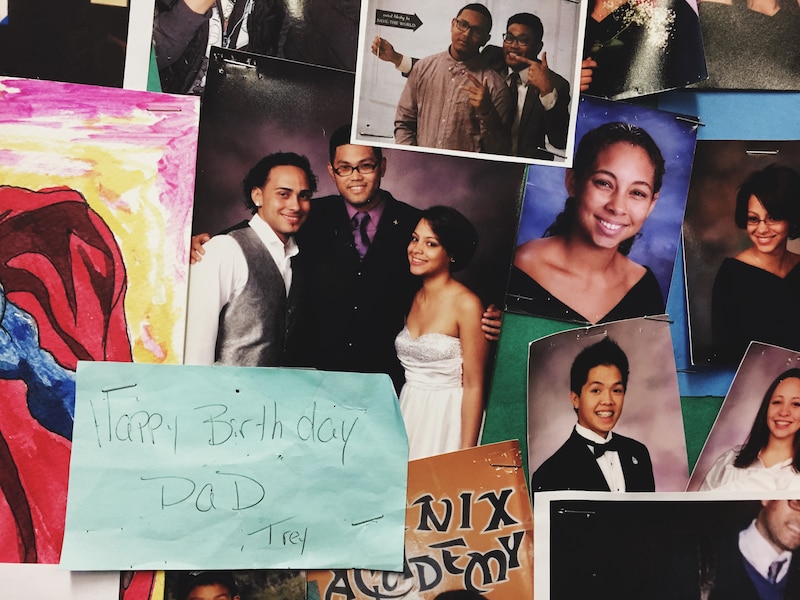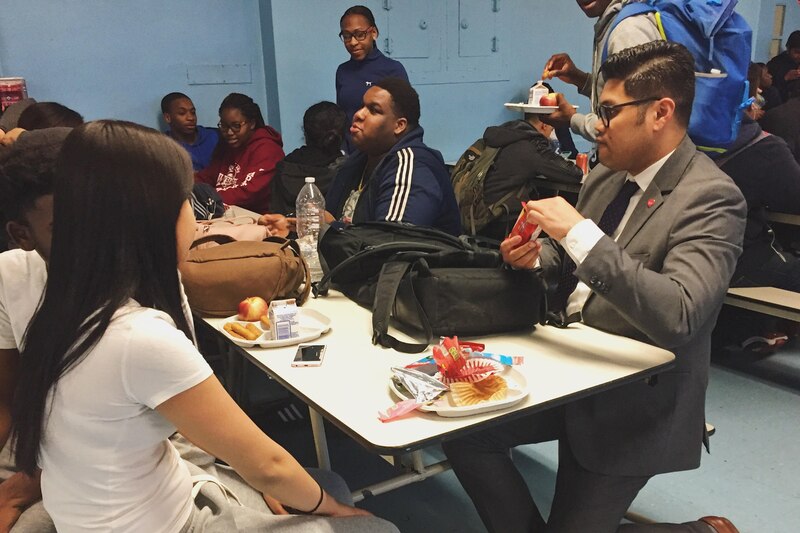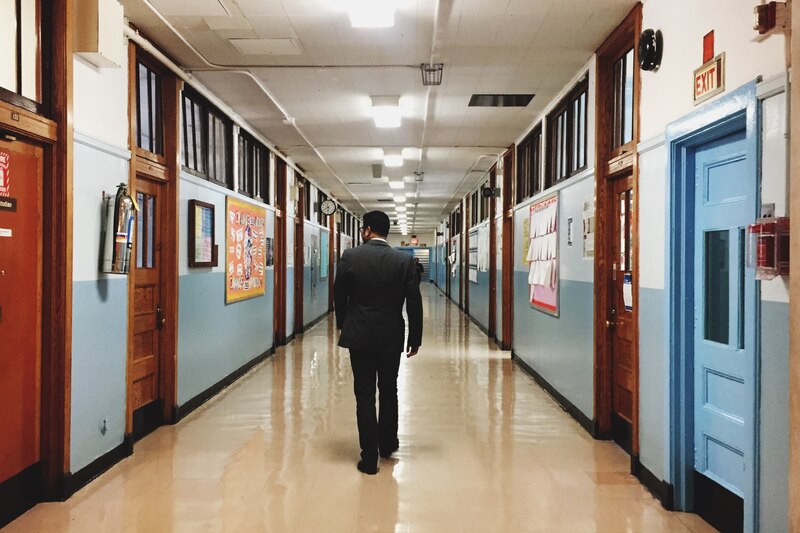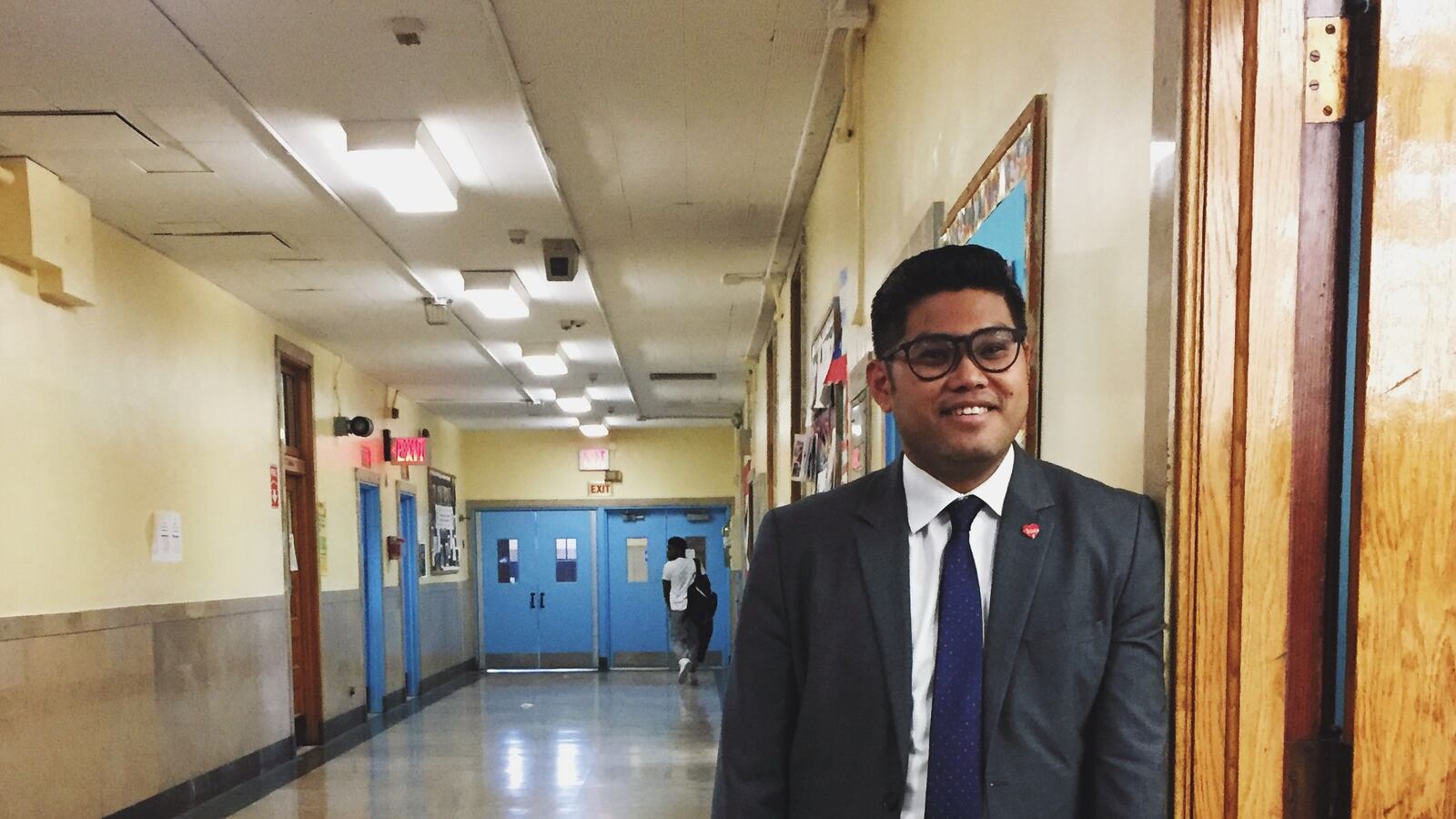It was an unusually chaotic morning for principal Carl Manalo. The A train, the only subway line that travels to this remote part of Far Rockaway Beach, was delayed nearly an hour that February morning, and seven teachers out of 20 called in absent due to a snowstorm the previous day.
Bessie Martinez, 19, sat across from the principal. She had just returned to school after several months’ absence, and Manalo used basic Spanish to talk through her new class schedule “temporario.” She should be a junior, but had just 13 credits of the 44 needed to graduate, and speaks almost no English.
“She’s been working,” Manalo said after Martinez left, concerned. “We thought we had lost her, but we found her and got her back.”
Martinez’s story is a familiar one at Queens High School for Information, Research and Technology, where 30 percent of its 413 students are English language learners. Many are undocumented, unaccompanied minors, or refugees from El Salvador and Mexico who have ended up in this corner of New York City.
Keeping students in school is Manalo’s biggest challenge, since most of its population lives below the poverty line and many families rely on these students for income. Next year, the school will open a transitional bilingual education program to offer more classroom instruction in Spanish, another step in what many teachers describe as the once struggling school’s radical transformation.
For Manalo, that transformation is centered around vulnerable students like Martinez, who are just one step from dropping out and becoming “the lost ones.”
***
Founded in 2008, the school — known as QIRT — occupies half of the first floor of the old Far Rockaway High School, a large comprehensive high school. In 2004, that school was placed on Mayor Michael Bloomberg’s list of the city’s most dangerous schools and it was fully phased out in 2011. Even before that, however, four smaller middle and high schools cropped up on its campus.
The early years of QIRT were difficult. The school consistently performed at the bottom of the city in standardized tests, and burned through three principals in five years.
When Manalo arrived as a first-time principal in 2014, teachers were frustrated with the constantly changing leadership. Students saw faculty as transient because of a high turnover rate and inconsistent rule enforcement. There was no money for an art teacher or afterschool programs.
Spanish teacher JoMarie Figueroa, who started at QIRT the same year as Manalo, described the school as “a wild horse.” Kids had nothing to do outside the classroom, she said, and there was rampant fighting in the hallways. Only 12 percent of graduates were college ready, 26 points below the borough average.
In his first year as principal, Manalo said, only 10 of QIRT’s 94 seniors were on track to graduate. Another dozen could not be found.
Since then, graduation rates have risen to 70 percent, up from 55 percent during Manalo’s first year. He hopes to reach the citywide goal of 80 percent in the next year or two.
QIRT’s turnaround didn’t start with academics, Manalo said, but with acknowledging the specific, individual, and often very personal needs of students, and their teachers.
“We’re a Cinderella school,” he said. He hopes QIRT will become a school where every child feels like they can go to the ball.
***
Manalo knows what it’s like to grow up feeling out of place. He was raised in a poor neighborhood in the North Bronx, the child of Filipino immigrants. A scholarship allowed him to consider college out of state, and he fell in love with Vanderbilt University in Nashville, Tennessee.
When he turned 18 years old, Manalo came out as gay — first to his friends and later to his parents, who had a hard time with the news. At school and in his Bronx neighborhood, he said, “there wasn’t anyone like me to look up to.” And the conservative Vanderbilt campus was not the bastion of acceptance he might have hoped for. He was outed at the school, he said, and his dorm room door was vandalized. Manalo struggled with whether he was in the right place. He considered transferring.
“I decided I belong here,” he eventually concluded, “and I need to make it better.” He became an activist on campus, campaigning for the LGBTQ community.
Manalo studied education in college but said he felt pressure to enter a field with more financial security and took a job in human resources. A year out of college, however, he was riding the subway home and saw an advertisement overhead for the New York Teaching Fellows, an alternative route to becoming a public school teacher. “Nobody ever comes back years later to thank their middle manager,” he remembers reading on the ad. Unhappy with the monotony of his current job, it struck him to his core.
He immediately enrolled in a masters program in education at Fordham University. In September 2002, Manalo began teaching English at Alfred E. Smith High School, which was then a large, struggling vocational school in a high-poverty neighborhood in the South Bronx.

He quickly learned that being a good teacher often meant going beyond the classroom. “Some teachers are afraid of talking to their students, because of what a kid might say,” he said. Teachers are often afraid, he said, that they will have to take action because of something a student tells them. “Oh well, I say, someone has to do it.”
After Smith, Manalo moved to Lehman High School, another large high school in the Bronx, and then joined the Department of Education as an achievement coach, helping struggling schools across the city make improvements. He grew interested in starting his own school, but after two years of applying unsuccessfully for a new school charter, he was approached about taking over as principal at QIRT.
He accepted immediately, excited to take the helm of a school still in its infancy. It seemed like the perfect place to try to make a big change, starting with the school’s culture.
***
As principal, Manalo greets each student in the hall by first and last name. He frequently reminds students to remove their hoodies or hats as they pass, but he is just as likely to ask how a sick mother is doing, or how an application for a college scholarship is coming along. Students reach out for high-fives on their way to gym, and tell him jokes.
He said he didn’t talk about his sexuality when he was a new teacher. “You don’t know who you are as an educator,” he said. “But then you decide, screw it. This is me. These are my kids.”
As principal, he is openly gay. He is the faculty advisor for the LGBT club, and has led trainings for teachers to ensure the community is an accepting place. “It’s important for kids to see that you can be gay and have a normal life,” he said.
Manalo spends two hours each school day visiting classrooms, observing teachers, and helping students with their assignments, calling that time “the joy” of his day. Walking from room to room, he pokes sleeping students awake and engages the class with questions about their lessons. He stops frequently as he walks, to bend over and pick up bits of paper and trash from the floor.
“I never wanted to be a leader. I just wanted to be a teacher,” he said, an attitude his staff seems to pick up on.
“He treats everyone like we are all on the same level,” said Tenesha Worley, vice principal in charge of school culture. “It makes everyone feels supported,” she said. And when teachers feel supported, she added, they feel empowered to support others.
***
Building a rapport with his faculty took time. In Manalo’s first year as principal, four teachers left or retired. He struggled both to retain other staff and to recruit new teachers to QIRT. Many were reluctant to travel far from their homes to a school perceived as failing.
And some teachers had to change their approach to the role. Manalo is quick to correct a teacher who speaks about a student in a way he considers inappropriate. “It’s one thing to talk about the limits of a student,” he said, “and another to make a blanket statement about how a student can’t achieve.”
Manalo meets with his teachers once a week during lunch to discuss individual students they are worried about academically and emotionally. Each student identified as at-risk by the school is assigned a faculty advisor, who checks in with the student and makes sure he or she is getting the necessary tutoring and assistance.
With students who are homeless or undocumented, every teacher works together to support them, and each other. If there is any irregularity in their attendance or behavior, Manalo wants to be the first to know.
Manalo keeps his closet stocked with tea for students who want to come by and talk. He said he likes to make tea because it puts him in a position of service to the student. By altering the dynamic, he can shift the way students feel about approaching faculty with problems inside or outside the school.
This philosophy has resonated with some students. “Students know what kind of principal they have,” said senior, Jimmy Ortiz, 19. In their school, “they have a say, too, now. He listens to their ideas.”

In the mini-fridge beside the coffee maker, Tupperware containers are filled with an extra lunch or dinner he made at home for one particular student, recently out of jail, who does online coursework in the office.
Manalo also found room in the budget to hire students who are at risk of dropping out or failing due to work conflicts for jobs in the main office or after school.
“His gift is making everyone think that his ideas are their ideas,” said Worley. She recalls one QIRT student whose family lost its income. The student was thinking about leaving school to go to work. When Manalo learned of the student’s situation, he discreetly published an advertisement for a part-time job at QIRT. Manalo encouraged the student to apply and made sure he had a formal interview. “When the student gets the job, they feel like they found a solution and they accomplished something,” Worley said.
For Manalo, these small interventions boil down to a relatively simple idea: “I just say, be the person you needed when you were younger.”
***
Manalo sees his dedication to individual students mirrored by his teachers and administrators. When Manalo interviews a candidate for a teaching position at QIRT, one of the most important questions he asks is: Why did you decide to become a teacher? Everyone hired to work at QIRT answered: For the students.
“My job is to help them realize that goal, every day,” he said.
QIRT’s connection with parents and the Far Rockaway community are harder to realize. Some parents work two or three jobs. Others who are undocumented are afraid of coming to the school, a problem exacerbated since the presidential election by rumors of immigration raids in traditionally safe spaces, like schools.
In the months since the election, Manalo has seen attendance among English learners falter. He circulated flyers with information about student’s immigration rights and had individual conversations to assuage student fears after the election.
“I want them to have faith in the system,” he said. “I want them to know that the safest place they can be is in school.”
***
Manalo admits there is an emotional toll in taking on so many of his students’ burdens. He knows he has students who are going home to apartments without electricity or water, or leaving school to clock in at an all-night job, or sleeping on the subway. These things weigh on his mind in his off-hours.

He is prone to forgetting it is Friday when school lets out for the week, and is still navigating life without his partner of seven years. They split this fall, and Manalo believes his new role as principal was a force behind the realization that the relationship wasn’t working.
“I didn’t need as much when I was a teacher,” he said, his usually brisk voice growing quiet. “I went from being support to needing more support.”
He no longer feels comfortable in the teachers’ lounge. “They need a space to vent about you,” he explained, “And when you make a difficult decision, not everyone is going to agree with it.”
On really tough days, he might sit in the back of a classroom or sneak down to the school’s daycare center for teenage mothers to see the babies. It reminds him of what he is working toward.
He gains strength from the stories of his students. “When you hear what the refugee kids go through, it’s humbling,” he said, referring to his school’s large population of Central American refugees. “It makes you want to do better because of it.”
The graduation rate for English learners at QIRT has improved, but remains low at 55 percent. Manalo has worked with teachers to design a schedule for students who are at risk of dropping out to support their families. He groups them together in English class and moved lunch to the end of the school day, making it the second to last period. Since many of the students have the last period of the day off, they can eat a free lunch and go straight to work without having to miss class.
Manalo often eats dinner at the diner on Long Island where two of his students work as busboys after school. He stays as late as he can, bringing work with him, but they are always still there when he leaves. He leaves a cash tip with the check.
This story first appeared on The Home Room, a publication produced by the Covering Education class at Columbia Journalism School.

